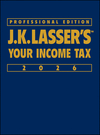Answered: August 27, 2020 10:39 pm
My parent is in assisted living. Is a statement from a doctor required in order to deduct the cost of this care?
For the costs of assisted living to be deductible as an itemized medical expense, the resident must be chronically ill. This means the resident is (1) unable to perform at least two of the six activities of daily living (eating, dressing, bathing, transferring, toileting, and continence), or (2) requires supervision due to a cognitive impairment, such as Alzheimer’s disease. The care afforded in an assisted living facility must be provided by a licensed medical professional under a written plan of care. Then most of the costs of assisted living can be viewed as deductible medical expenses.
Earned income
Compensation for performing personal services. You must have earned income for a deductible IRA or to claim the earned income credit.



